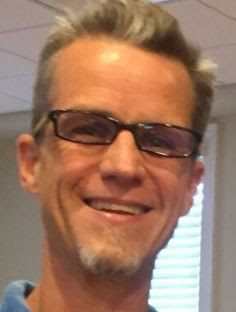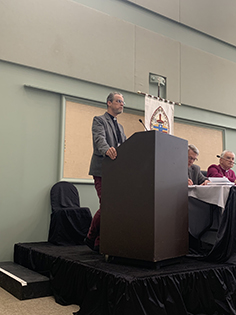New Associate Rector
St. George’s Hires New Associate Rector
By Mac Trammell

The Rev. Dr. Noah Campbell
“The danger of using ‘anthropology’ is that it can be reductionistic.”
Barely 15 minutes into his first substantive conversation with a church reporter, The Rev. Dr. Noah Campbell, the newly hired Associate Rector at St. George’s Episcopal Church, warns why ‘anthropology’ might not be the precise word. They’re talking about scripture, not only as a divinely inspired spiritual lodestar, but also as a cultural and historical signifier. The reporter offered up ‘anthropology,’ in an admittedly reductionistic attempt to simplify Campbell’s nuanced thoughts into an albeit still complicated, yet contained, one-word idea.
“It carries theology and spiritual truth,” Campbell said of scripture, “that is transcendent of the culture from which it emerged, but it’s still embedded in a cultural milieu.”
‘Anthropology,’ an SAT caliber, five-syllable stud, might have been a good, even great word for most of us to describe Campbell’s musings. But it wasn’t precise, and that bothered him enough to mark for the record why it wasn’t.
“It’s incarnation in that sense,” he started. “It has aspects of divine and human in it… That sensibility as both a high regard for scripture, but also a willingness to study the scripture academically and historically and with the other disciplines as well, sociologically, anthropologically.
“But I also still believe it is a vessel that contains for us theological truth,” he continued “so not just truth we map onto it. So I’m using ‘inspired’ in a dogmatic way, like a traditional way.”
If you can’t tell already, the guy is every English teacher’s dream. He is extremely careful with his expansive diction, frequently pausing mid-thought to decide how best to verbalize his ensuing message.
If you study his academic background, the 48 year-old’s proficient use of language will not surprise. The St. Louisan majored in History at Southwest Baptist University in Bolivar, Mo., studied Language at Sangre de Cristo Seminary, whose own Wikipedia entry states it “strongly emphasizes Biblical exegesis and the Biblical languages,” then wrote his masters thesis, approximately 80 pages, on one half of one verse from Ecclesiastes. Not one book, not one chapter, not even one whole verse. 80 pages on half of one verse.
“I spent a lot of years studying that stuff,” he said.
At this point, a disclaimer may be warranted. Campbell does not spend his spare time combing through the dictionary or studying definitions on flash cards. His hobbies span from gardening to hiking to writing and playing music (which of course is in its own way a meditation on lyricism).
His favorite genres include Folk and Americana, though he sheepishly admits he likes the melodic nature of some of Drake’s hits.
“I like music that is artful, you know? Whatever genre. Something that just strikes me as earnest and good.”
That includes the high musical bar that St. George’s sets for itself.

The Rev. Dr. D. Noah Campbell speaks at the podium during the Diocesan Convention Nov. 16, 2018 at St. George’s Episcopal Church
“I was really excited by what seems to be an evolving identity as a place for excellent music, and I just love that personally,” he remarked on what drew him to the opening at St. George’s. Though it was not music alone that enticed him.
“You have a remarkably beautiful space,” he began “and a comprehensive set of ministries and programs, and then you have these incredibly high standards that you’re trying to attain musically and culturally [like] using your wall space to promote local artists—that just says something about things that I also really like and value.”
His new boss, the Rev. Dr. Dorothy Wells, Rector of St. George’s Church where Campbell will be installed as her new Associate Rector at the beginning of December, approves of his multi-faceted nature.
“He’s just a cool guy,” she said. “He’s a cool musician. He’s a cool person. I think he will relate well to everyone here.
“I think he will relate well across all kinds of age spectrums,” she continued, “and certainly as one who has come to the Episcopal Church from other traditions, he will relate well to people who are not cradle Episcopalians who have been on that seeking journey to find the place that they really belong.”
She’s referencing Campbell’s Baptist background, a tradition in which he grew up in St. Louis before being ordained as a Baptist minister in 2002. He flipped, however, to the Episcopal Church in 2016, working as Canon Missioner for Bishop Don Johnson since June 2018. In that short span he’s led the effort to re-appropriate the Barth House on the campus of the University of Memphis and has acted as a “troubleshooter” in the words of Bishop Johnson, visiting parishes in West Tennessee that were in need of assistance from the diocesan office.
Campbell made the conversion from the Baptist church because he appreciated the Episcopal approach to scriptures. And it is at this point in the infancy of their conversation that Campbell and the reporter begin their unpacking of the duality of scripture as well as the specificity of the word ‘anthropology.’ This interaction sparked the journalist to ask him about the importance of language.
Campbell said he’s energized by the study of hermeneutics, or in borderline sacrilegiously reductionistic terms, the interpretation of the Bible. “How we get at the right meaning of the texts” is how he described it. The reason he feels so energized by the power of words derives from his sense of how valuable they are.
“Words are just not cheap,” he explained. “They have such a range of association. With the sort of way that a word can land, I guess I just want to…” here he pauses, redirecting his answer. “I had a seminary professor who used to always say, ‘I don’t want you to hear what I’m not saying,’ because of associations with words.”
He continued, explaining with an example.
“Like if I say the word ’evangelism,’ that can mean so many different things, so many different things. And a lot of the associations with that word are actually expressions of evangelism that I would reject because it’s manipulative, or abusive, or theologically bullying, or disrespectful to other traditions. But I also believe the word ‘evangelism’ has a power to it as well, rightly understood.”
When asked about Campbell’s careful language, Wells took the opportunity to associate that trait with a deeper, emotional characteristic of his.
“The choices of language are really just indicative of the depth of his spirituality,” she said.
“He’s a deeply spiritual person,” she explained. “I think he’ll bring a lot of gifts to us in terms of understanding spirituality,” adding “and I think he’s just a lot of fun to be around.”
Campbell is energized not only by words and their meaning within a Biblical context, but also by the sense of stability that comes with his new job. He hasn’t served as a minister for a parish since 2011, and he said he’s excited to be back in that context again.
“It’s good to be back,” he said. “It feels like I’m coming home.”
